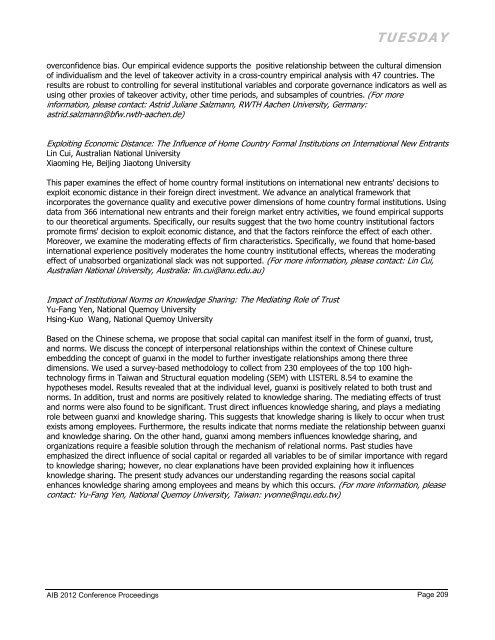AIB 2012 Conference Proceedings - Academy of International ...
AIB 2012 Conference Proceedings - Academy of International ...
AIB 2012 Conference Proceedings - Academy of International ...
You also want an ePaper? Increase the reach of your titles
YUMPU automatically turns print PDFs into web optimized ePapers that Google loves.
TUESDAY<br />
overconfidence bias. Our empirical evidence supports the positive relationship between the cultural dimension<br />
<strong>of</strong> individualism and the level <strong>of</strong> takeover activity in a cross-country empirical analysis with 47 countries. The<br />
results are robust to controlling for several institutional variables and corporate governance indicators as well as<br />
using other proxies <strong>of</strong> takeover activity, other time periods, and subsamples <strong>of</strong> countries. (For more<br />
information, please contact: Astrid Juliane Salzmann, RWTH Aachen University, Germany:<br />
astrid.salzmann@bfw.rwth-aachen.de)<br />
Exploiting Economic Distance: The Influence <strong>of</strong> Home Country Formal Institutions on <strong>International</strong> New Entrants<br />
Lin Cui, Australian National University<br />
Xiaoming He, Beijing Jiaotong University<br />
This paper examines the effect <strong>of</strong> home country formal institutions on international new entrants' decisions to<br />
exploit economic distance in their foreign direct investment. We advance an analytical framework that<br />
incorporates the governance quality and executive power dimensions <strong>of</strong> home country formal institutions. Using<br />
data from 366 international new entrants and their foreign market entry activities, we found empirical supports<br />
to our theoretical arguments. Specifically, our results suggest that the two home country institutional factors<br />
promote firms' decision to exploit economic distance, and that the factors reinforce the effect <strong>of</strong> each other.<br />
Moreover, we examine the moderating effects <strong>of</strong> firm characteristics. Specifically, we found that home-based<br />
international experience positively moderates the home country institutional effects, whereas the moderating<br />
effect <strong>of</strong> unabsorbed organizational slack was not supported. (For more information, please contact: Lin Cui,<br />
Australian National University, Australia: lin.cui@anu.edu.au)<br />
Impact <strong>of</strong> Institutional Norms on Knowledge Sharing: The Mediating Role <strong>of</strong> Trust<br />
Yu-Fang Yen, National Quemoy University<br />
Hsing-Kuo Wang, National Quemoy University<br />
Based on the Chinese schema, we propose that social capital can manifest itself in the form <strong>of</strong> guanxi, trust,<br />
and norms. We discuss the concept <strong>of</strong> interpersonal relationships within the context <strong>of</strong> Chinese culture<br />
embedding the concept <strong>of</strong> guanxi in the model to further investigate relationships among there three<br />
dimensions. We used a survey-based methodology to collect from 230 employees <strong>of</strong> the top 100 hightechnology<br />
firms in Taiwan and Structural equation modeling (SEM) with LISTERL 8.54 to examine the<br />
hypotheses model. Results revealed that at the individual level, guanxi is positively related to both trust and<br />
norms. In addition, trust and norms are positively related to knowledge sharing. The mediating effects <strong>of</strong> trust<br />
and norms were also found to be significant. Trust direct influences knowledge sharing, and plays a mediating<br />
role between guanxi and knowledge sharing. This suggests that knowledge sharing is likely to occur when trust<br />
exists among employees. Furthermore, the results indicate that norms mediate the relationship between guanxi<br />
and knowledge sharing. On the other hand, guanxi among members influences knowledge sharing, and<br />
organizations require a feasible solution through the mechanism <strong>of</strong> relational norms. Past studies have<br />
emphasized the direct influence <strong>of</strong> social capital or regarded all variables to be <strong>of</strong> similar importance with regard<br />
to knowledge sharing; however, no clear explanations have been provided explaining how it influences<br />
knowledge sharing. The present study advances our understanding regarding the reasons social capital<br />
enhances knowledge sharing among employees and means by which this occurs. (For more information, please<br />
contact: Yu-Fang Yen, National Quemoy University, Taiwan: yvonne@nqu.edu.tw)<br />
<strong>AIB</strong> <strong>2012</strong> <strong>Conference</strong> <strong>Proceedings</strong><br />
Page 209

















